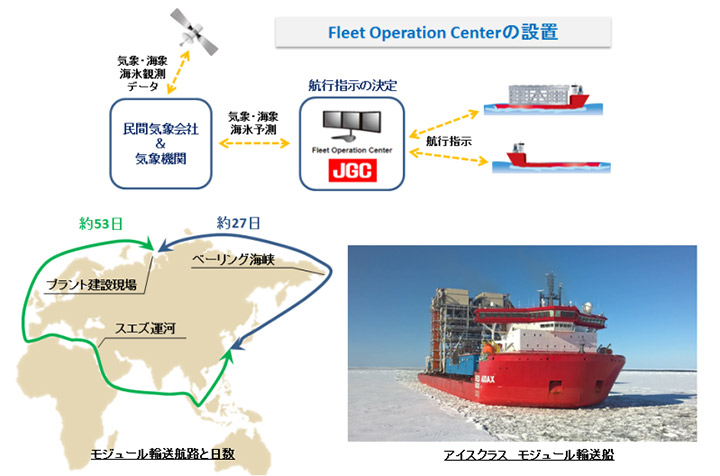Shortening the Transportation Time of Sensitive Construction Materials by Pioneering the Use of Northern Sea Routes
JGC HOLDINGS CORPORATION
| Publication date | May 09, 2018 (Posted on December 09, 2022) |
|---|---|
| Sector | Industrial and economic activities |
Company Overview

Since its establishment in 1928, JGC CORPORATION has been engaged in the construction of a wide range of plants and facilities around the world, mainly in the oil and gas field including oil, natural gas, petrochemical, and LNG plants; extending to the energy infrastructure field including power plants and nonferrous metal plants; the industrial infrastructure field; the social infrastructure field including pharmaceutical plants, hospitals, and environmental facilities. The company is recognized as one of the world's leading engineering contractors.
Adaptation Initiatives
As the average temperature rises due to climate change, the sea ice in the Arctic Ocean has been decreasing every summer, and the use of the Northern Sea Route is drawing attention as a new transportation route. In our Yamal LNG Project (construction site: Yamal Peninsula above the Arctic Circle), the construction materials, such as plant modules, produced in Southeast Asia were transported through the Bering Strait using the Northern Sea Route as much as possible, and the transportation period was greatly shortened (*1). Below is the evaluation of the project.
[Evaluation of the navigation in module transportation]
- Reduced fuel consumption
- Reduced risk of piracy in the Gulf of Aden
- Reduced cost of passing through the Suez Canal
[Evaluation as a Project]
- Contribution to shorter delivery time for plant completion
- Shorter period of exposure to the marine environment (less damage to materials due to ship motion, less impact on metal fatigue and rusting)
- Improved module equipment storage conditions (temperature and humidity control) by avoiding tropical regions
(*1) Average number of days required for module transportation from the module fabrication site in northern China to the plant construction site: 27 days via the Bering Strait/53 days via the Suez Canal
The navigation of the Northern Sea Route is subject to the restrictions of the IMO (International Maritime Organization) Convention and the Russian law, and also requires the fulfillment of complicated requirements and criteria, such as the use of vessels with appropriate certificates, the management of operations on land and skills and proficiency of the crew. In addition, in order to overcome different technical issues such as constant observation of weather, conditions of the Arctic Ocean, and sea ice forecasting of the route, a Fleet Operations Center was established. We created a centralized system to manage the fleet, schedule, and transportation environment for the plant materials making full use of the information from weather companies and shipping companies. This has contributed not only to the success of the project by commercializing the use of the Northern Sea Route, but also to the stable supply of clean energy by pioneering the way for exporting LNG as a product after the completion of the plant.


